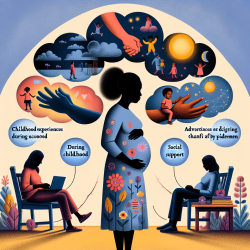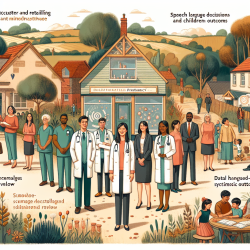Introduction
Pregnancy is a critical period that shapes the health and well-being of both the mother and the developing infant. Recent research highlights the profound impact of adverse childhood experiences (ACEs) and recent stressful life events on pregnant women's social well-being. Understanding these influences can aid practitioners in improving outcomes for pregnant women by integrating these insights into their practice.
Key Findings from the Research
The study titled "Women's Social Well-Being During Pregnancy: Adverse Childhood Experiences and Recent Life Events" explores the relationship between ACEs, recent life events, and social well-being among pregnant women. The research identifies four critical aspects of social well-being: social support, couple aggression, neighborhood safety, and food insecurity.
Implications for Practitioners
Practitioners can leverage these findings to enhance their practice in several ways:
- Assessing Social Support: Understanding that recent stressful life events are linked to lower social support can guide practitioners to focus on strengthening support networks for pregnant women.
- Addressing Couple Aggression: The unique association between ACEs and couple aggression highlights the need for targeted interventions that address relational dynamics in pregnant women with a history of childhood adversity.
- Enhancing Neighborhood Safety: Recognizing the impact of childhood adversity on perceptions of neighborhood safety can prompt community-level interventions to improve environmental conditions for expectant mothers.
- Combating Food Insecurity: The link between stressful life events and food insecurity suggests that practitioners should prioritize food security initiatives as part of comprehensive prenatal care.
Encouraging Further Research
The study underscores the importance of a life-course perspective in understanding pregnant women's social well-being. Future research should explore additional mechanisms such as perceived stress and emotional regulation to further elucidate the pathways linking ACEs and recent life events to social well-being. Practitioners are encouraged to stay informed about emerging research to continuously refine their approaches.
Conclusion
Adverse childhood experiences and recent stressful life events significantly impact pregnant women's social well-being. By integrating these insights into practice, practitioners can better support pregnant women, ultimately improving outcomes for both mothers and their infants. To read the original research paper, please follow this link: Women's Social Well-Being During Pregnancy: Adverse Childhood Experiences and Recent Life Events.










